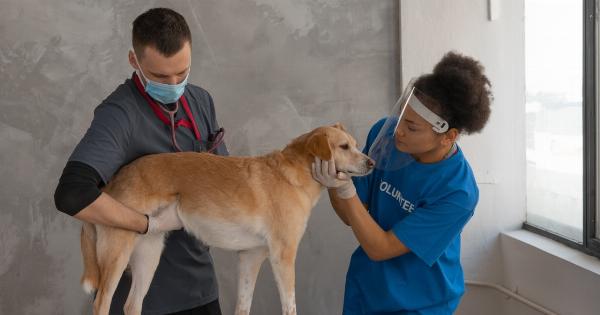As pet owners, our furry friends’ health is a top priority. Just like humans, pets need routine care and attention to ensure they lead long, healthy lives.
Proper nutrition, regular exercise, and preventative measures are all necessary components of maintaining our pets’ well-being. In this article, we will explore different aspects of pet health and provide essential tips to keep our beloved companions in the best possible shape.
Nutrition: The Foundation of Good Health
Proper nutrition plays a vital role in the health and longevity of our pets. A well-balanced diet is essential for providing the necessary nutrients, vitamins, and minerals they need.
Commercial pet foods have options tailored to different life stages and specific dietary requirements. Consulting with a veterinarian can help determine the most suitable diet for your pet.
It is important to remember that pets have different nutritional needs than humans. While some human foods are safe for pets, others can be toxic. Chocolate, onions, grapes, and raisins are examples of foods that can be harmful to dogs and cats.
Always consult with your veterinarian before introducing new foods to your pet’s diet.
Physical Exercise for Healthy Bodies
Exercise is not only beneficial for our own well-being, but it is also essential for our furry friends. Regular physical activity helps maintain a healthy weight, strengthens muscles, and supports cardiovascular health.
The amount and type of exercise required vary depending on the pet’s breed, age, and overall health.
For dogs, daily walks and interactive play sessions are great ways to keep them active. Some breeds may require more vigorous exercise, such as running, hiking, or swimming.
Cats, on the other hand, can benefit from toys, scratching posts, and regular playtime to fulfill their natural hunting instincts.
Remember, when exercising with your pet, always consider their comfort and safety. Avoid excessive heat or cold, and provide plenty of water during physical activities.
Dental Health: More Than Just a Pretty Smile
Just like humans, oral health is crucial for our pets’ overall well-being. Poor dental hygiene can lead to various health issues, including gum disease, tooth decay, and even organ damage.
Regular dental care can prevent these problems and contribute to your pet’s overall health.
Brushing your pet’s teeth regularly is the most effective way to maintain good dental hygiene. Use a toothbrush and toothpaste specifically designed for pets as human products can be harmful to them.
Additionally, certain chew toys and dental treats can help clean teeth and reduce plaque buildup. Consulting with a veterinarian on proper dental care techniques is recommended.
Preventive Care: The Key to Early Detection
Regular veterinary check-ups and preventative care are essential for detecting any potential health issues early on. Vaccinations, parasite prevention, and routine screenings are all part of providing comprehensive care for your pet.
Vaccinations protect pets from various diseases, including rabies, distemper, and feline leukemia. These vaccines build immunity and help prevent the spread of potentially fatal illnesses.
Additionally, regular screenings for heartworms, internal parasites, and certain cancers can significantly contribute to early detection and treatment.
Parasite control, such as flea and tick prevention, is critical to your pet’s overall health. Fleas and ticks can transmit diseases and cause discomfort.
Regular application of preventive medications, in consultation with a veterinarian, is necessary to keep your pet free from such parasites.
Stress Management for Content Pets
Our pets experience stress, just like we do. Factors such as changes in routine, loud noises, separation anxiety, or a new environment can all contribute to stress levels in our furry friends.
Addressing and managing stress is essential for their overall well-being.
Providing a safe and comfortable environment with familiar objects, such as their bed or toys, can help reduce stress. Calming techniques, such as pheromone diffusers or anxiety wraps, may also be beneficial.
Creating a consistent routine and ensuring regular exercise and mental stimulation can go a long way in minimizing stress.
Mental Stimulation: Keeping Your Pet’s Mind Sharp
Physical exercise is crucial, but mental stimulation is equally important for the overall health and well-being of our pets. Boredom can lead to destructive behavior and negatively impact their mental health.
Engaging activities and toys designed to challenge their intelligence and problem-solving skills can keep their minds sharp and stimulated.
For dogs, interactive toys that dispense treats or puzzles that require problem-solving are excellent options. Cats can benefit from interactive toys, scratching posts, and regular playtime with their owners.
Spaying and Neutering: Benefits Beyond Population Control
Spaying and neutering our pets not only helps control the pet population but also provides several health benefits.
Spaying female pets reduces the risk of uterine and mammary gland infections, while neutering male pets minimizes the risk of testicular and prostate problems. Additionally, these procedures can help reduce certain behavioral issues, including aggression and roaming tendencies.
Grooming: More Than Just a Beauty Routine
Grooming is an essential part of pet care that goes beyond mere aesthetics. Regular grooming sessions help maintain healthy skin and coat, prevent matting, and detect any skin issues or abnormalities early on.
Some pets require more frequent grooming than others, so understanding your pet’s specific needs is crucial.
Brushing your pet’s coat regularly helps distribute natural oils, remove loose hair, and prevent tangles or matting. It also provides an opportunity to check for any parasites or skin irritations.
Additionally, regular nail trims, ear cleaning, and dental checks should be incorporated into your pet’s grooming routine.
Senior Pet Care: Adjusting to Changing Health Needs
As our pets age, their health needs change. Keeping a close eye on their overall well-being becomes even more important. Senior pets often require more frequent veterinary check-ups, specialized diets, and modifications to their exercise routines.
Regular blood work and diagnostic screenings can help detect age-related diseases or conditions early on. Ensuring their comfort by providing orthopedic bedding and addressing any mobility issues is also essential.
Consulting with your veterinarian for specific senior care recommendations based on your pet’s breed, size, and health history is highly recommended.
Conclusion
Our furry friends bring immense joy and love into our lives. By prioritizing their health and well-being, we can ensure they live long, happy lives by our side.
Proper nutrition, regular exercise, preventive care, and mental stimulation all contribute to the overall health of our pets. Additionally, grooming, stress management, and adjusting to the changing needs of senior pets help maintain their quality of life.
Remember, always consult with a veterinarian for personalized advice and guidance to provide the best possible care for your furry companions.





























